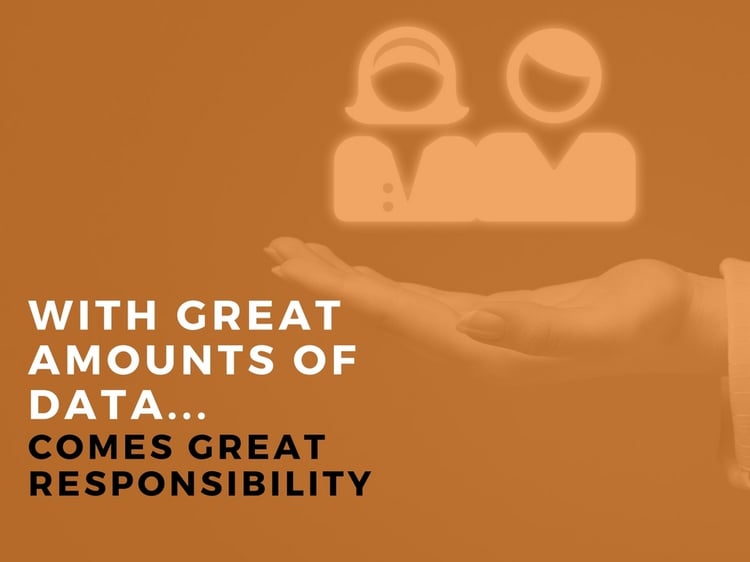It’s no secret that today’s consumer demands a deeper level of customer focus. Consumers are increasingly willing to provide organizations with data in order to...

Today’s marketplace lends itself to a more robust level of data analysis than anybody could have possibly envisioned before the dawn of the Internet. The use of data for marketing purposes is both an expectation and requirement. Consumers want individualized marketing that provides value, but to create that individualization, marketers must gather consumer data. With great amounts of data comes great responsibility.
It’s up to every organization to be responsible data-driven marketers. This means using data when appropriate to enhance the customer experience and drive revenue without becoming invasive or harmful to a person’s life experience.
Irritating, Unfair and Unethical Data Usage: The Downside to Lots of Consumer Data
The abundance of data at the disposal of modern marketers puts them in a somewhat challenging situation. On one hand, they’re expected to turn data into exciting, actionable insights to individualize the customer experience. But on the other hand, they have to find a way to use data to their advantage while avoiding anything that might be construed as creepy or an invasion of privacy.
The sale of consumer data between organizations is becoming increasingly problematic, and it’s not limited to name and address information. According to Newsweek, the level of data exchanged between companies goes much deeper than basic demographics, and it runs the gamut of everything from sexual orientation to payment history. The implications of these data improprieties can be staggering, with unscrupulous individuals going as far as using acquired data to identify which people might be most likely to fall for a scam. Additionally, this underground data exchange can result in people unwittingly missing out on opportunities like jobs and loans. And because this is all done under the table, none of these people will ever understand the reasons why they’ve lost out on the things they want or need.
Fortunately, these extreme examples are limited to a small percentage of unethical companies, but for the individuals who are affected by this unethical use of data, once was too often. Most companies that deal in data are committed to responsible data-driven marketing. We’ve discussed sharing website visitors’ consumer data with other companies on our podcast 2 Guys and Some Data. There’s no right or wrong answer to sharing or not sharing consumer data. After all, creating individualized marketing relies on creating a single customer viewpoint. But we strongly believe you can reap more value from your website visitors’ intent data if you maintain it for your internal use only. That’s why we don’t share our client’s consumer data with outside organizations. It’s your responsibility to use the data you gather in the best interests of your consumers.
Privacy Compliant vs. Responsible Marketing
There are plenty of regulations in place that are geared towards protecting both companies and consumers. It goes without saying that all companies that work with data must play by the established rules. Failure to do so will result in that business facing legal sanctions or even closure.
But there’s more to the privacy story than simply following the rulebook.
There’s abiding by the letter of the law, and there’s operating in the spirit of a law. In other words, just because something is technically legal doesn't necessarily make it right. Responsible marketing requires marketers who are able to utilize data in a manner that fully protects consumers from unwanted and potentially harmful actions. Living by these scruples isn’t always easy in a hyper-competitive business landscape, but it’s necessary in order to meet the high expectations of consumers, and to maintain the trust of your customers.
It takes a combination of legal compliance, common sense and practicality to not only play by the rules, but to operate within the spirit of the established guidelines. To that end, the Direct Marketing Association has published the DMA Guidelines for Ethical Business Practice, which is listed on the DMA’s website for both members and non-members to access. With these guidelines widely available, there’s no reason for any business to scour the laws looking for acceptable practices when it comes to data. After all, consumer data belongs to people — real people with a very real right to privacy. Companies should respect consumer data and treat it as a way to make the lives of those consumers easier, and not just as a way to make a quick buck.
There’s only one acceptable reason why marketers collect data. It’s to help those marketers provide value on an individual level to those consumers who are most likely to respond in the form of a purchase, a donation, a subscription, etc. Any use of data that deviates from this goal should be scrutinized for privacy issues and ethical concerns.
The Future of Self-Regulated Data Usage
The issue of doing the right thing with data based purely on ethical reasons will become even more important in the years to come. As the Internet of Things continues to grow, more and more activities and appliances are becoming Internet-based, which will give marketers even more data to work with. This proliferation of data will surely move faster than any laws or guidelines, making the responsible use of data paramount for all companies.
No company ever got ahead waiting for someone else to act. The same principle applies to the growing amount of data available to marketers. Self-regulated data usage must become the norm for any company that utilizes consumer data. The time to rethink your company’s approach to data is now, and the practices you put into place will help to govern any changes that may occur in the marketplace.
Every consumer data profile is a relationship, and these profiles should be treated as such. You wouldn’t sell the private information of your family or friends to get ahead, and you shouldn’t do it to your customers either. And you definitely shouldn’t use new developments in technology as an excuse to exploit your customers for a quick financial gain.
At the end of the day, the data contract between consumer and company only works if both sides benefit. The reasons why companies benefit from the collection of data are endless. However, the customer’s role in the data contract shouldn’t be forgotten. Every piece of data you collect should be used with the customer’s satisfaction in mind. Don’t make them regret their role in the data contract.
Responsible data-driven marketing is a major undertaking for companies in the new data economy.
Companies must always strive to do the right thing with their collected data. Failure to do so represents a major breach of the data contract, one that puts the nature of trust between customer and company at serious risk. It’s only through following the spirit of the rules, every time, that a business can ethically fulfill its role in the data contract, maintain the trust of its customers, and increase the likelihood of a fruitful relationship that lasts for years.

